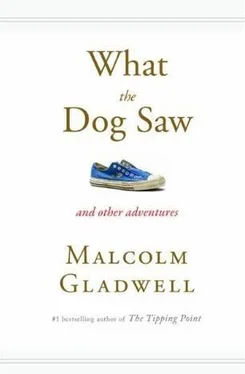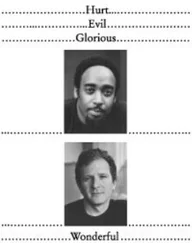On a recent spring morning, the staff of Empirica were concerned with solving a thorny problem having to do with the square root of n, where n is a given number of random set of observations, and what relation n might have to a speculator’s confidence in his estimations. Taleb was up at a whiteboard by the door, his marker squeaking furiously as he scribbled possible solutions. Spitznagel and Pallop looked on intently. Spitznagel is blond and from the Midwest and does yoga: in contrast to Taleb, he exudes a certain laconic levelheadedness. In a bar, Taleb would pick a fight. Spitznagel would break it up. Pallop is of Thai extraction and is doing a PhD in financial mathematics at Princeton. He has longish black hair and a slightly quizzical air. “Pallop is very lazy,” Taleb will remark, to no one in particular, several times over the course of the day, although this is said with such affection that it suggests that laziness, in the Talebian nomenclature, is a synonym for genius. Pallop’s computer was untouched and he often turned his chair around so that he faced completely away from his desk. He was reading a book by the cognitive psychologists Amos Tversky and Daniel Kahneman, whose arguments, he said a bit disappointedly, were “not really quantifiable.” The three argued back and forth about the solution. It appeared that Taleb might be wrong, but before the matter could be resolved the markets opened. Taleb returned to his desk and began to bicker with Spitznagel about what exactly would be put on the company boom box. Spitznagel plays the piano and the French horn and has appointed himself the Empirica DJ. He wanted to play Mahler, and Taleb does not like Mahler. “Mahler is not good for volatility,” Taleb complained. “Bach is good. St. Matthew’s Passion!” Taleb gestured toward Spitznagel, who was wearing a gray woolen turtleneck. “Look at him. He wants to be like von Karajan, like someone who wants to live in a castle. Technically superior to the rest of us. No chitchatting. Top skier. That’s Mark!” As Spitznagel rolled his eyes, a man whom Taleb refers to, somewhat mysteriously, as Dr. Wu wandered in. Dr. Wu works for another hedge fund, down the hall, and is said to be brilliant. He is thin and squints through black-rimmed glasses. He was asked his opinion on the square root of n but declined to answer. “Dr. Wu comes here for intellectual kicks and to borrow books and to talk music with Mark,” Taleb explained after their visitor had drifted away. He added darkly, “Dr. Wu is a Mahlerian.”
Empirica follows a very particular investment strategy. It trades options, which is to say that it deals not in stocks and bonds but with bets on stocks and bonds. Imagine, for example, that General Motors stock is trading at $50, and imagine that you are a major investor on Wall Street. An options trader comes up to you with a proposition. What if, within the next three months, he decides to sell you a share of GM at $45? How much would you charge for agreeing to buy it at that price? You would look at the history of GM and see that in a three-month period it has rarely dropped 10 percent, and obviously the trader is only going to make you buy his GM at $45 if the stock drops below that point. So you say you’ll make that promise, or sell that option, for a relatively small fee, say, a dime. You are betting on the high probability that GM stock will stay relatively calm over the next three months, and if you are right, you’ll pocket the dime as pure profit. The trader, on the other hand, is betting on the unlikely event that GM stock will drop a lot, and if that happens, his profits are potentially huge. If the trader bought a million options from you at a dime each and GM drops to $35, he’ll buy a million shares at $35 and turn around and force you to buy them at $45, making himself suddenly very rich and you substantially poorer.
That particular transaction is called, in the argot of Wall Street, an out-of-the-money option. But an option can be configured in a vast number of ways. You could sell the trader a GM option at $30, or, if you wanted to bet against GM stock going up, you could sell a GM option at $60. You could sell or buy options on bonds, on the S &P index, on foreign currencies, or mortgages, or on the relationship among any number of financial instruments of your choice; you can bet on the market booming, or the market crashing, or the market staying the same. Options allow investors to gamble heavily and turn one dollar into ten. They also allow investors to hedge their risk. The reason your pension fund may not be wiped out in the next crash is that it has protected itself by buying options. What drives the options game is the notion that the risks represented by all of these bets can be quantified; that by looking at the past behavior of GM, you can figure out the exact chance of GM hitting $45 in the next three months, and whether at $1 that option is a good or a bad investment. The process is a lot like the way insurance companies analyze actuarial statistics in order to figure out how much to charge for a life-insurance premium, and to make those calculations every investment bank has, on staff, a team of PhDs, physicists from Russia, applied mathematicians from China, and computer scientists from India. On Wall Street, those PhDs are called quants.
Nassim Taleb and his team at Empirica are quants. But they reject the quant orthodoxy, because they don’t believe that things like the stock market behave in the way that physical phenomena like mortality statistics do. Physical events, whether death rates or poker games, are the predictable function of a limited and stable set of factors, and tend to follow what statisticians call a normal distribution, a bell curve. But do the ups and downs of the market follow a bell curve? The economist Eugene Fama once studied stock prices and pointed out that if they followed a normal distribution, you’d expect a really big jump, what he specified as a movement five standard deviations from the mean, once every seven thousand years. In fact, jumps of that magnitude happen in the stock market every three or four years, because investors don’t behave with any kind of statistical orderliness. They change their mind. They do stupid things. They copy one another. They panic. Fama concluded that if you charted the ups and downs of the stock market, the graph would have a “fat tail,” meaning that at the upper and lower ends of the distribution there would be many more outlying events than statisticians used to modeling the physical world would have imagined.
In the summer of 1997, Taleb predicted that hedge funds like Long Term Capital Management were headed for trouble because they did not understand this notion of fat tails. Just a year later, LTCM sold an extraordinary number of options, because its computer models told it that the markets ought to be calming down. And what happened? The Russian government defaulted on its bonds; the markets went crazy; and in a matter of weeks LTCM was finished. Spitznagel, Taleb’s head trader, says that he recently heard one of the former top executives of LTCM give a lecture in which he defended the gamble that the fund had made. “What he said was, ‘Look, when I drive home every night in the fall I see all these leaves scattered around the base of the trees,’” Spitznagel recounts. “There is a statistical distribution that governs the way they fall, and I can be pretty accurate in figuring out what that distribution is going to be. But one day I came home and the leaves were in little piles. Does that falsify my theory that there are statistical rules governing how leaves fall? No. It was a man-made event.” In other words, the Russians, by defaulting on their bonds, did something that they were not supposed to do, a once-in-a-lifetime, rule-breaking event. But this, to Taleb, is just the point: in the markets, unlike in the physical universe, the rules of the game can be changed. Central banks can decide to default on government-backed securities.
Читать дальше











